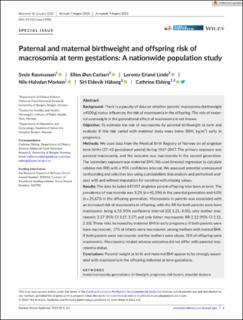| dc.contributor.author | Rasmussen, Svein | |
| dc.contributor.author | Carlsen, Ellen Øen | |
| dc.contributor.author | Linde, Lorentz | |
| dc.contributor.author | Morken, Nils-Halvdan | |
| dc.contributor.author | Håberg, Siri Eldevik | |
| dc.contributor.author | Ebbing, Cathrine | |
| dc.date.accessioned | 2023-09-15T11:42:13Z | |
| dc.date.available | 2023-09-15T11:42:13Z | |
| dc.date.created | 2023-09-07T10:50:16Z | |
| dc.date.issued | 2023 | |
| dc.identifier.issn | 0269-5022 | |
| dc.identifier.uri | https://hdl.handle.net/11250/3089741 | |
| dc.description.abstract | Background
There is a paucity of data on whether parents' macrosomia (birthweight ≥4500 g) status influences the risk of macrosomia in the offspring. The role of maternal overweight in the generational effect of macrosomia is not known.
Objective
To estimate the risk of macrosomia by parental birthweight at term and evaluate if this risk varied with maternal body mass index (BMI, kg/m2) early in pregnancy.
Methods
We used data from the Medical Birth Registry of Norway on all singleton term births (37–42 gestational weeks) during 1967–2017. The primary exposure was parental macrosomia, and the outcome was macrosomia in the second generation. The secondary exposure was maternal BMI. We used binomial regression to calculate relative risk (RR) with a 95% confidence interval. We assessed potential unmeasured confounding and selection bias using a probabilistic bias analysis and performed analyses with and without imputation for variables with missing values.
Results
The data included 647,957 singleton parent-offspring trios born at term. The prevalence of macrosomia was 3.2% (n = 41,396) in the parental generation and 4.0% (n = 25,673) in the offspring generation. Macrosomia in parents was associated with an increased risk of macrosomia in offspring, with the RR for both parents were born macrosomic being 6.53 (95% confidence interval [CI] 5.31, 8.05), only mother macrosomic 3.37 (95% CI 3.17, 3.57) and only father macrosomic RR 2.22 (95% CI 2.12, 2.33). These risks increased by maternal BMI in early pregnancy: if both parents were born macrosomic, 17% of infants were macrosomic among mothers with normal BMI. If both parents were macrosomic and the mothers were obese, 31% of offspring were macrosomic. Macrosomia-related adverse outcomes did not differ with parental macrosomia status.
Conclusions
Parents' weight at birth and maternal BMI appear to be strongly associated with macrosomia in the offspring delivered at term gestations. | en_US |
| dc.language.iso | eng | en_US |
| dc.publisher | Wiley | en_US |
| dc.rights | Attribution-NonCommercial-NoDerivatives 4.0 Internasjonal | * |
| dc.rights.uri | http://creativecommons.org/licenses/by-nc-nd/4.0/deed.no | * |
| dc.title | Paternal and maternal birthweight and offspring risk of macrosomia at term gestations: A nationwide population study | en_US |
| dc.type | Journal article | en_US |
| dc.type | Peer reviewed | en_US |
| dc.description.version | publishedVersion | en_US |
| dc.rights.holder | Copyright 2023 The Author(s) | en_US |
| cristin.ispublished | true | |
| cristin.fulltext | original | |
| cristin.qualitycode | 1 | |
| dc.identifier.doi | 10.1111/ppe.13005 | |
| dc.identifier.cristin | 2173149 | |
| dc.source.journal | Paediatric and Perinatal Epidemiology | en_US |
| dc.relation.project | Norges forskningsråd: 320656 | en_US |
| dc.relation.project | Norges forskningsråd: 262700 | en_US |
| dc.identifier.citation | Paediatric and Perinatal Epidemiology. 2023. | en_US |

